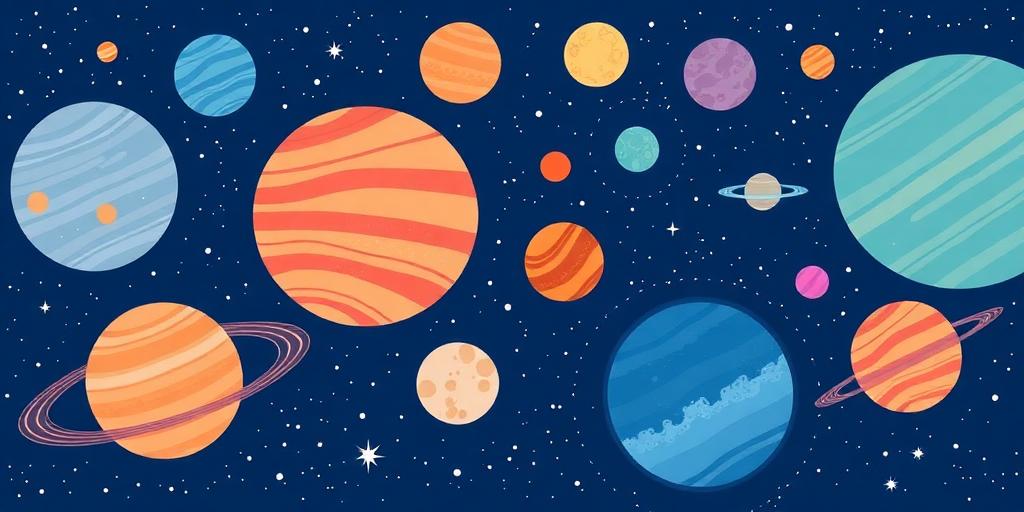Planetary Science: Exploring Other Worlds
Planetary science is a fascinating field that combines astronomy, geology, physics, chemistry, and biology to study planets, moons, asteroids, comets, and other celestial bodies within our solar system and beyond. It seeks to understand the formation, evolution, and composition of these worlds, as well as the processes that shape them. In this article, we'll delve into the key areas of planetary science and the exciting discoveries being made.
The Formation of Planetary Systems
One of the central questions in planetary science is how planetary systems form. The prevailing theory, known as the nebular hypothesis, suggests that planets arise from protoplanetary disks—rotating clouds of gas and dust—around young stars. Within these disks, particles collide and clump together, eventually forming planetesimals, which then accrete to become protoplanets and, finally, planets.
Scientists study young star systems to observe these processes in action. Missions like the Hubble Space Telescope and the James Webb Space Telescope provide invaluable data on the composition and structure of protoplanetary disks, helping us refine our understanding of planet formation.
Understanding Planetary Composition
Determining the composition of planets and other celestial bodies is crucial for understanding their history and evolution. Planetary scientists use a variety of techniques to analyze the materials that make up these worlds.
- Spectroscopy: By analyzing the light reflected or emitted by a planet, scientists can identify the elements and molecules present in its atmosphere and surface.
- Sample Analysis: Missions that return samples from other worlds, such as the Apollo missions to the Moon and future missions to Mars, provide direct access to planetary materials for detailed laboratory analysis.
- Remote Sensing: Instruments on spacecraft can map the surface composition of planets using infrared, ultraviolet, and other types of electromagnetic radiation.
Exploring the Solar System
Our solar system is home to a diverse array of planets, moons, asteroids, and comets, each with its unique characteristics. Planetary science missions have visited many of these worlds, providing invaluable data and images.
Terrestrial Planets
The terrestrial planets—Mercury, Venus, Earth, and Mars—are rocky worlds with solid surfaces. Missions to these planets have revealed evidence of past volcanic activity, impact craters, and, in the case of Mars, ancient riverbeds and lakes. Understanding the geological history of these planets helps us understand the processes that have shaped Earth as well.
Gas Giants
The gas giants—Jupiter, Saturn, Uranus, and Neptune—are massive planets composed primarily of hydrogen and helium. Missions like Voyager and Cassini have provided stunning images of these planets' swirling atmospheres, ring systems, and numerous moons. These missions have also revealed the presence of subsurface oceans on some of the gas giants' moons, raising the possibility of life beyond Earth.
Dwarf Planets and Small Bodies
Beyond Neptune lies the Kuiper Belt, a region of icy bodies that includes Pluto and other dwarf planets. Missions like New Horizons have provided detailed images of Pluto's surface, revealing a complex and geologically active world. Asteroids and comets, remnants from the early solar system, also provide valuable insights into the conditions that existed when the planets formed.
The Search for Exoplanets
In recent years, the discovery of exoplanets—planets orbiting stars other than our Sun—has revolutionized planetary science. Thousands of exoplanets have been identified, ranging from gas giants to rocky worlds. Scientists are using telescopes like Kepler and TESS to search for exoplanets in the habitable zones of their stars, where conditions may be suitable for liquid water and life.
The Future of Planetary Science
The future of planetary science is bright, with many exciting missions planned for the coming years. These missions will explore new worlds, search for signs of life, and deepen our understanding of the universe. Some notable missions include:
- Europa Clipper: A mission to Jupiter's moon Europa, which is believed to harbor a subsurface ocean.
- Dragonfly: A rotorcraft lander that will explore Saturn's moon Titan, which has a thick atmosphere and liquid hydrocarbon lakes.
- Mars Sample Return: A mission to return samples from Mars for detailed analysis on Earth.
Conclusion
Planetary science is a dynamic and interdisciplinary field that seeks to unravel the mysteries of our solar system and the universe beyond. By studying planets, moons, asteroids, and comets, scientists are gaining a deeper understanding of the formation, evolution, and composition of these worlds. With ongoing missions and future exploration plans, planetary science promises to continue to reveal fascinating discoveries and expand our knowledge of the cosmos.









